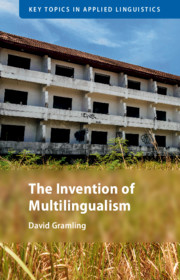Book contents
- The Invention of Multilingualism
- Key Topics In Applied Linguistics
- The Invention of Multilingualism
- Copyright page
- Dedication
- Contents
- Figures
- Preface
- Acknowledgments
- Introduction
- 1 Right-Sizing Multilingualism
- 2 The Problem of Value
- 3 Justice and Injustice
- 4 Hospicing Late Mono/lingualism
- Epilogue The Multilingual Undercommons
- Glossary
- References
- Index
Epilogue - The Multilingual Undercommons
Published online by Cambridge University Press: 04 June 2021
- The Invention of Multilingualism
- Key Topics In Applied Linguistics
- The Invention of Multilingualism
- Copyright page
- Dedication
- Contents
- Figures
- Preface
- Acknowledgments
- Introduction
- 1 Right-Sizing Multilingualism
- 2 The Problem of Value
- 3 Justice and Injustice
- 4 Hospicing Late Mono/lingualism
- Epilogue The Multilingual Undercommons
- Glossary
- References
- Index
Summary
Based on the temporal schema of “hospicing late mono/lingualism” explored in Chapter 4, the Epilogue takes up the question of accountability to other generations of multilingual subjects, past and future, and considers how we may set out to assess that accountability. The epilogue ends in the form of an “Undercommon Framework of Reference for Languages,” based on the European Framework, as reinterpreted through the lens of Stefano Harney and Fred Moten’s Black Studies-based conception of the Undercommons (2013). The book closes with a conceptual glossary of terms, used throughout these chapters and the Introduction, that aid the purposeful work of reinvigorating multilingualism for the coming century.
- Type
- Chapter
- Information
- The Invention of Multilingualism , pp. 201 - 212Publisher: Cambridge University PressPrint publication year: 2021

